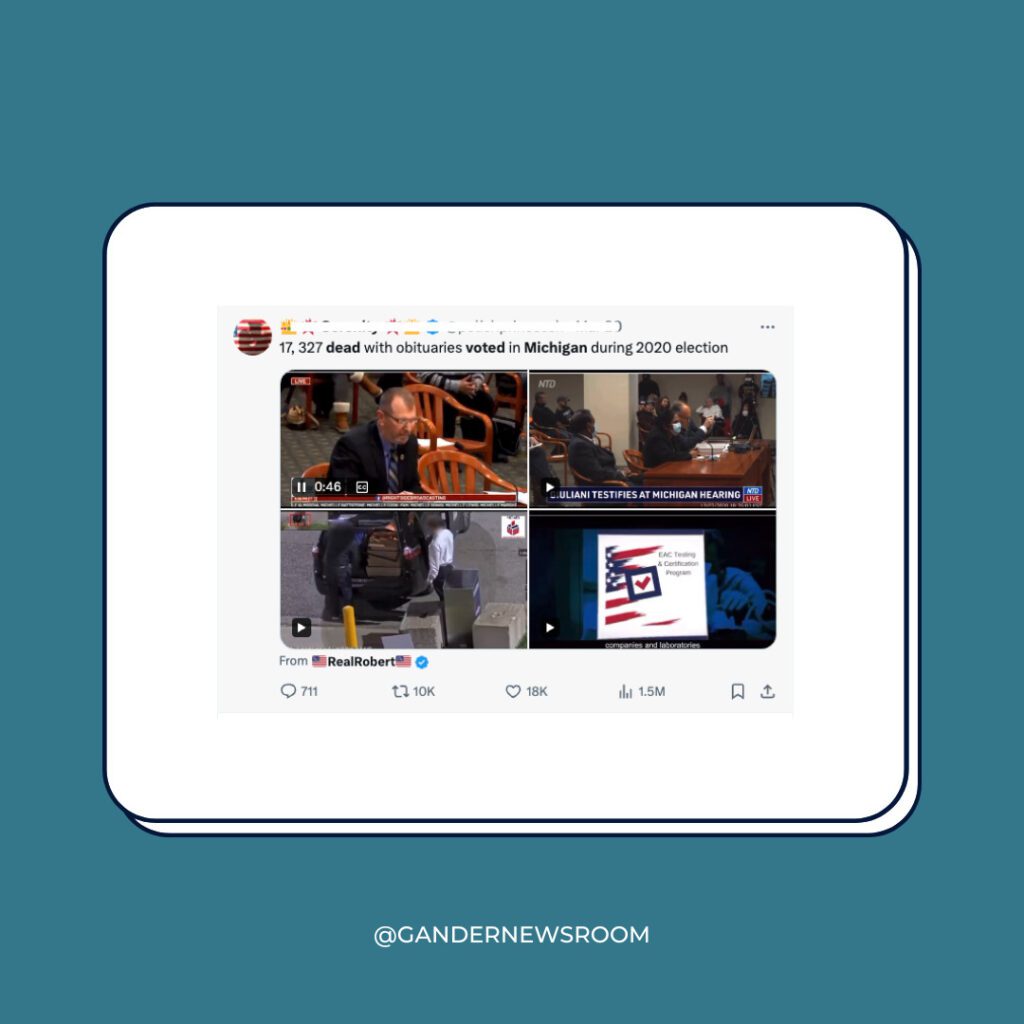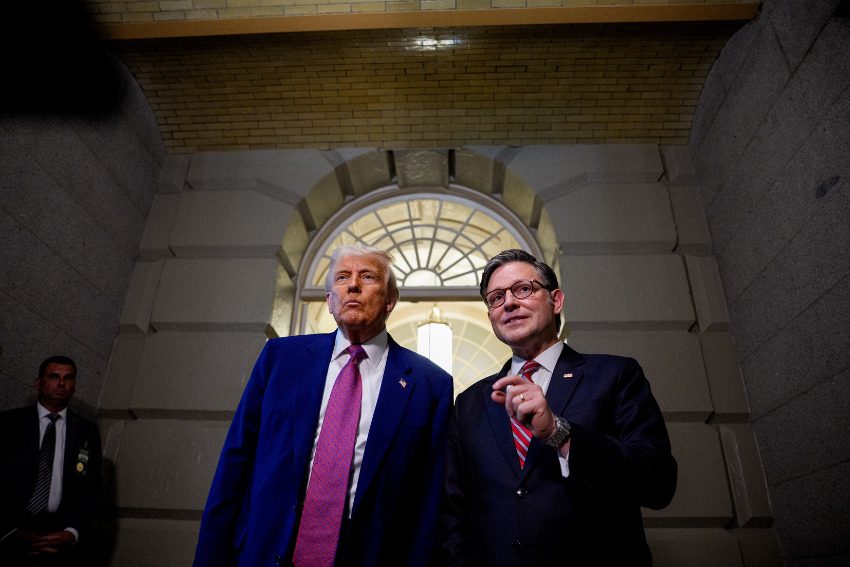
Photo Illustration/Stephanie Keith/Getty Images
Posts circulating across right-wing circles on social media feature false and misleading claims about voting and counting ballots in this year’s election. Here’s the truth:
MICHIGAN—With less than one week until the presidential election, a steady stream of false and misleading information is gaining traction online in what marks a clear attempt among right-wing influencers to raise distrust about elections before the results have a chance to arrive.
Many of the recent claims—which include allegations of wrongdoing surrounding voting and counting ballots in Michigan—have already been thoroughly debunked by election officials.
Here’s a look at four of those biggest claims, along with the facts:
1. Michigan has more registered voters than people eligible to vote.
Posts circulating on social media claim that Michigan has 500,000 more registered voters than it has people eligible to vote—a point that has been used to suggest possible fraud in the system.

But the claim ultimately misrepresents Michigan’s voter registration data, adding inactive voters to the total of those registered and active to make it appear there is an issue with the state’s voting system.
Here are the facts:
Michigan has a voting age population of approximately 7.9 million people, but it has approximately 8.4 million registered voters.
At first glance, that may sound confusing, but here’s how that’s possible: that 8.4 million figure includes 1.2 million “inactive voters” —people who have not voted for six consecutive years or have not responded to a notice confirming their residency—possibly because they’ve left the state.
Under state and federal law, those inactive voters cannot legally be removed from voter rolls until they’ve been sent a written state notice that their registration is subject to cancellation and two federal election cycles pass without any response or voting activity from the voter.
So, this legally-mandated waiting period is ultimately why there are more total registered voters than eligible ones in the state, election officials said. Inactive voters are still eligible to vote but it does not mean those extra people on the rolls are voting.
In fact, nearly 600,000 of these inactive voters are currently set to be automatically removed from the state’s voter rolls over the next three years. More than 339,000 voter registrations are slated for cancellation in 2025 and more than 257,000 in 2027.
As of March 2024, Michigan had canceled more than 800,000 voter registrations since 2019—including 273,609 for possible changes of residency, 532,513 for deaths, and 16,716 at the request of the voter, according to data from Secretary of State Jocelyn Benson’s office.
In reality, once you take into account those 1.2 million inactive voters, there are only 7.2 million active registered voters in Michigan—well below the 8.4 million conspiracy theorists are amplifying.
Still, numerous social media users have suggested these numbers are proof that Michigan is trying to cheat in the 2024 election. Among them is billionaire X (formerly Twitter) owner Elon Musk, who has committed at least $70 million in support of former President Donald Trump.
Benson also responded on X, stating: “Let’s be clear: @elonmusk is spreading dangerous disinformation. … There aren’t more voters than citizens in Michigan. There are 7.2 million active registered voters and 7.9 [million] citizens of voting age in our state. Musk is pushing a misleading number that includes 1.2 million inactive records slated for removal in accordance with the law.”
For context: Michigan is hardly the only state with large numbers of inactive voters on its rolls. Forty-four states also operate under state and federal laws that require them to send voters a written notice and wait two federal election cycles before their voter registration is canceled.
2. Dead people are voting in this year’s election.
This one is simply not true.

Here are the facts:
Ballots of voters who have died are rejected in Michigan—even if the voter cast an absentee ballot and then died before Election Day, according to a statement from Benson’s office.
Lists circulating that claim to show otherwise are inaccurate, with many of them not containing enough information to accurately compare them to the state’s Qualified Voter File. Officials at Benson’s office have also personally reviewed several of these claims and have been unable to confirm a single instance of a ballot being cast on behalf of a deceased individual in Michigan.
While investigating the claims, election officials said they’ve found clerical errors where a ballot was recorded as cast by a dead person when it was actually cast by a living person with a similar name. The state’s Qualified Voter File has also been found to contain erroneous birthdates (like 1890 vs 1990) or placeholder birthdates (like Jan. 1, 1900) that might make it look like a voter must be dead based on their birthdate, when, in fact, that voter is alive.
In other instances, dead people are still registered to vote—but it does not mean they actually voted. Election officials use Social Security Administration data to regularly remove the names of dead people from the Qualified Voter File, but the process isn’t fool-proof. Voters sometimes stay on the voter rolls until clerks identify the dead person’s record to manually cancel it.
Regardless, there are safeguards in place to ensure ballots cannot be cast on behalf of another person—dead or otherwise, according to election officials. That includes a signature match. Reports of illegal voting activity are also investigated for potential criminal prosecution.
The Republican National Committee filed a federal lawsuit in March against Benson and Michigan Bureau of Elections Director Jonathan Brater for allegedly failing to “maintain clean and accurate voter registration records.” The suit was dismissed by US District Judge Jane Beckering, who said the plaintiffs lacked legal standing and did not state a plausible claim.
3. Delayed election results are shady election results.
Polls close at 8 p.m. on election night, but Michigan Secretary of State Jocelyn Benson expects voters may not see the early results of the state’s presidential election until the following day.
And some social media users are latching on to Benson’s predictions about the state’s unofficial election results to push their own conspiracies about the legitimacy of the state’s election.

But there’s a good reason for the potential delay.
Here are the facts:
More than 2 million Michiganders had already cast their ballot in this year’s General Election—which represents nearly 25% of the state’s active registered voters. More than 1.7 million of those voters have voted by mail or returned their ballots to a ballot drop box.
Each of those ballots takes time for election officials to retrieve, open, verify against signatures, and scan through a tabulator before they can be compiled into preliminary election results.
While a recent change in state law enables election officials in larger cities and townships to speed up the process by beginning to process mail ballots eight days prior to Election Day, it’s not a system that has been adopted in every jurisdiction in Michigan—so some areas will be slower than others to report out results that include a full tally of their absentee ballots.
Benson has credited the change in state law for helping speed up the turnaround on early election results in this year’s primary election and she expects it will help expedite the process again. But it may still take up to 24 hours for election officials to count up ballots, Benson said.
4. Non-citizens are voting en masse in Michigan.
Another lie.

One University of Michigan student from China allegedly cast a ballot at an Ann Arbor polling place this month despite not being a US citizen, which is required to be eligible to vote.
That lone instance of one non-citizen voting in this year’s presidential election is reportedly set to result in criminal charges that could land the student in prison for up to nine years. No other case of a non-citizen voting in this year’s election has emerged in Michigan or elsewhere.
In a joint statement, Benson and Washtenaw County Prosecutor Eli Savit said that any other non-citizens who attempt to vote fraudulently in Michigan this year will also be “exposing themselves to great risk and will be prosecuted to the fullest extent of the law.”
Noncitizen voting is exceedingly rare, reports Michigan Advance. Officials and election integrity researchers have found only a few dozen examples of noncitizen voting over the course of several years, and those examples are typically prosecuted, as officials plan to do in Michigan.
Election experts also caution that a single vote from someone who is not a US citizen and is therefore ineligible to vote (like in Ann Arbor) is not a sign of widespread illegal voting.
The Associated Press contributed to this report.
READ MORE: A step-by-step guide to how the vote counting process works in Michigan
For the latest Michigan news, follow The ‘Gander on Twitter.
Follow Political Correspondent Kyle Kaminski here.
Support Our Cause
Thank you for taking the time to read our work. Before you go, we hope you'll consider supporting our values-driven journalism, which has always strived to make clear what's really at stake for Michiganders and our future.
Since day one, our goal here at The 'Gander has always been to empower people across the state with fact-based news and information. We believe that when people are armed with knowledge about what's happening in their local, state, and federal governments—including who is working on their behalf and who is actively trying to block efforts aimed at improving the daily lives of Michigan families—they will be inspired to become civically engaged.


Michiganders say Trump’s cuts to food assistance could leave their families hungry
Michiganders are speaking out against Republican-led cuts to federal food assistance programs, warning the changes would leave thousands of families...

Opinion: Dear John James, Medicaid Is a lifeline. Please don’t let my family down
One Michigan mom wants Rep. John James to consider families like hers before cutting Medicaid benefits. Last month, my family traveled to D.C. to...

Report: Food assistance cuts would cost Michigan about $900 million
BY ANNA LIZ NICHOLS, MICHIGAN ADVANCE MICHIGAN—The more than $290 billion cuts to federal food assistance programming being passed through Congress...

Opinion: Attacks on Medicaid are a direct attack on Michiganders – and our nation
Trump’s plan to cut Medicaid threatens critical services provided by Planned Parenthood of Michigan Republican members launched their worst attack...

Michigan Republicans pass bill to carve out tax breaks for the wealthy atop health care cuts
Roughly 750,000 Michiganders are set to lose access to their healthcare coverage under Republican-led legislation approved Thursday morning in the...







